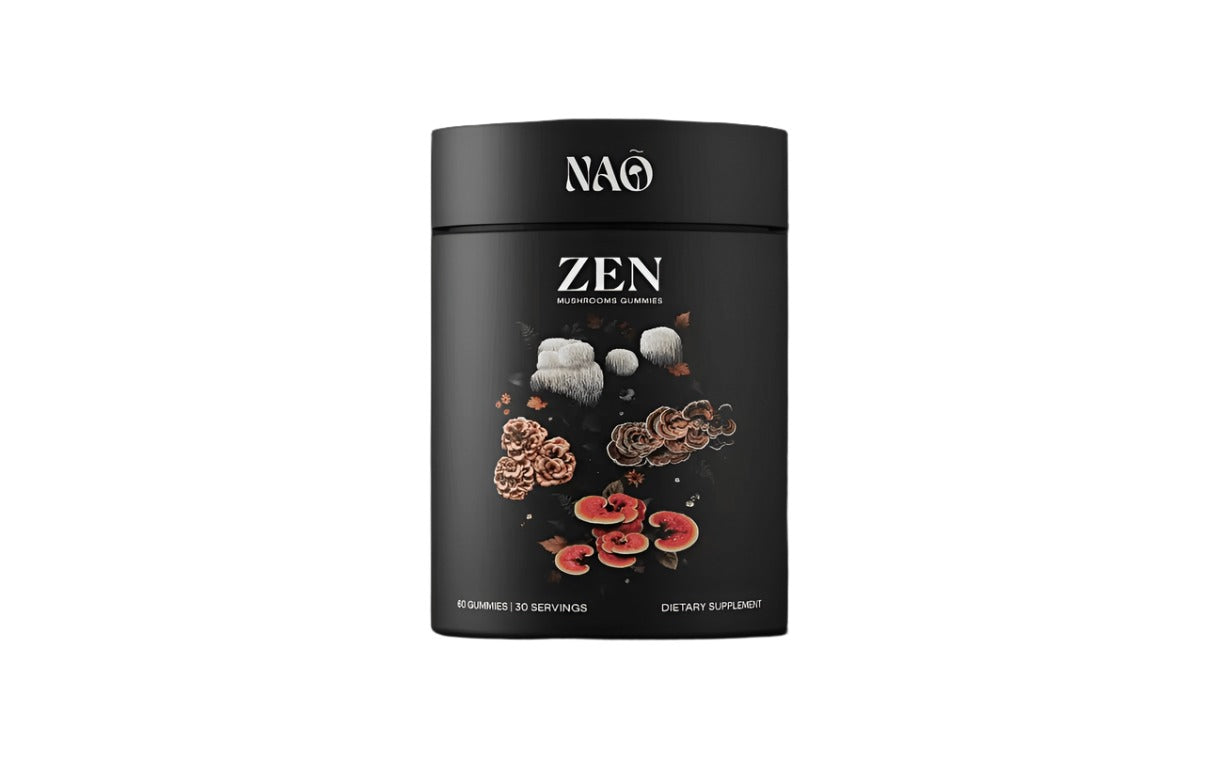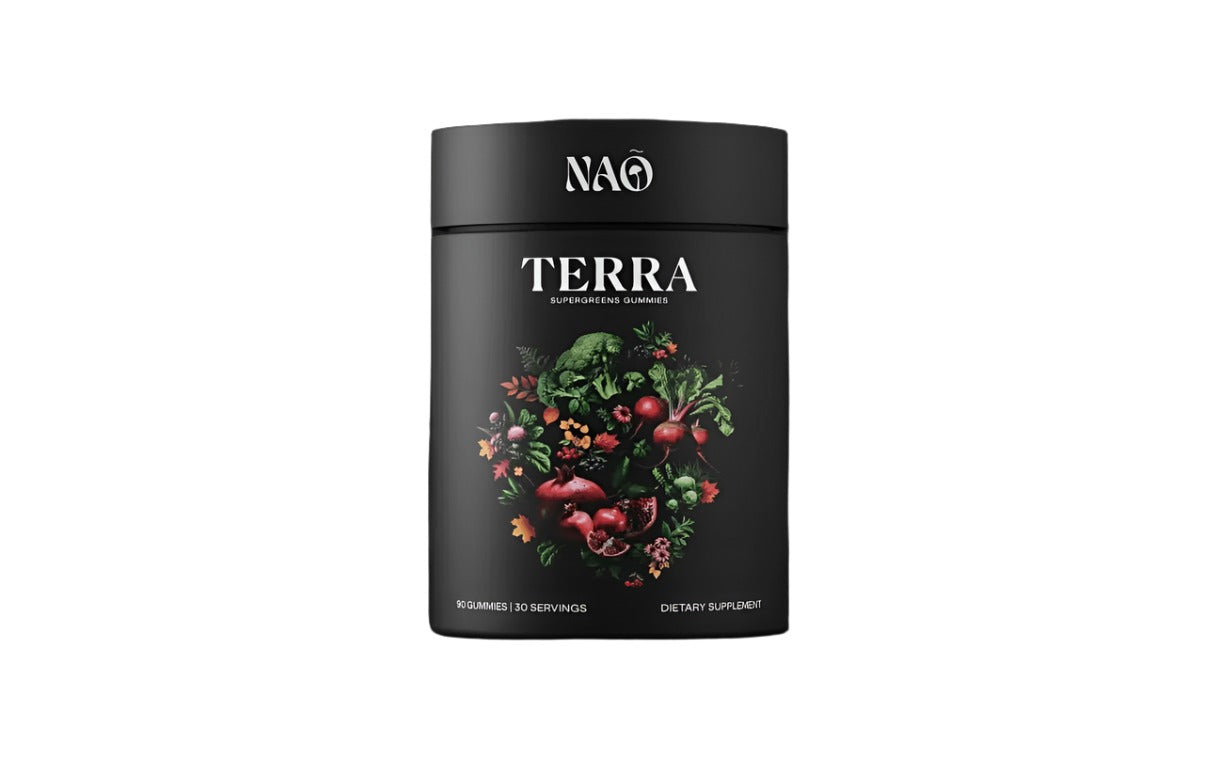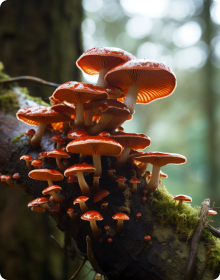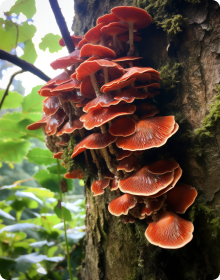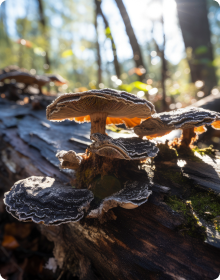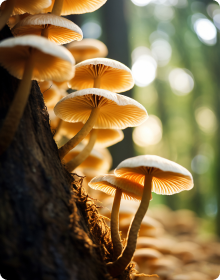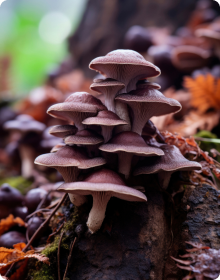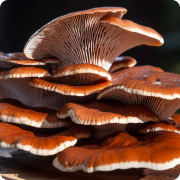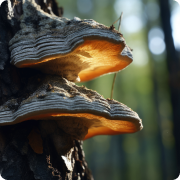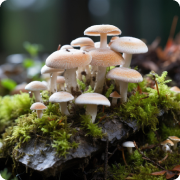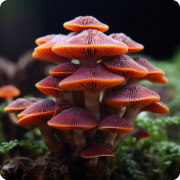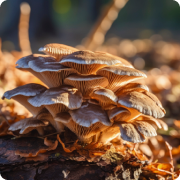Imagine a culinary showdown between two of the most significant mushroom scions: Shiitake vs Maitake. These fungi not only spice up your dishes but are actually treasure troves of medicinal health benefits that can significantly change the way you feel and live. You may know by now that Maitake mushrooms have been linked to a more efficient and enhanced immune system and might help maintain blood sugar levels, decreasing risk factors by up to 50 percent.
While Shiitake mushrooms are full and punchy, they are also known for their rich umami taste. In addition, they are said to be an excellent support to heart health and really offer a good dose of one’s daily intake of vitamin D. Interested in knowing how it can add more than a little oomph to your dishes while contributing toward a much healthier you? It is in this regard that the secrets of Shiitake vs Maitake mushrooms come undone to decide on your new go-to for flavor and health.
Get into this guide and discover the magic behind these fungi – elevate your kitchen game!
Introduction to Maitake and Shiitake Mushrooms
What has fascinated the culinary world, however, is the palette of flavors and impressive health benefits associated with mushrooms. With hundreds of edible fungi, two have gained prominence: Maitake vs Shiitake. These mushrooms are known not just for the flavor they add but also for various health properties.
Knowing these two varieties of mushrooms can add another dimension to your cooking and improve your health significantly. The next passage presents the exciting history and features of the two outstanding mushrooms, Maitake vs Shiitake, as related to their health benefits.
Interesting? You can try Maitake and Shiitake mushrooms on WellNao!
What Are Maitake Mushrooms?
The Maitake mushroom, also known as the Hen of the Woods, has a long history and medicinal use. In Japan, It has been celebrated in Eastern medicine for many centuries. Ancient texts refer to it as a dancing mushroom, symbolizing an attitude of joy and good fortune. Maitakes grow at the base of trees in clusters, similar to a hen’s ruffled feathers.

Mushrooms Maitake are a sight to behold. They are frilly and overlapping, and their color can range from light to dark brown. Not surprisingly, they often get a little crispy on the outside when cooked. And size-wise, it could be huge – sometimes as big as 10 pounds – which makes this mushroom all the more dramatic in appearance and pleasing to the eye. The Maitake mushroom taste adds a rich, earthy depth to any dish.
What Are Shiitake Mushrooms?
Shiitake mushrooms are another variety historically cultivated in East Asia, mainly Japan and China. Indeed, the name Shiitake is derived from the Japanese term for the tree – Shii trees. Shiitakes were valued not only for their flavor but also for their medicinal properties, harnessed for more than a millennium.

Shiitake mushrooms can be easily recognized by their broad, flat, or slightly convex, generally deep brown-colored, smooth, slightly leathery caps. They are often cultivated on logs or sawdust, which contributes to their distinctive taste and texture. Shiitake mushrooms are known for their rich umami-depth flavor profile, a savory taste that adds depth and complexity to dishes, making them a favorite among culinary enthusiasts.
Nutritional Comparison: Maitake vs Shiitake
Such nutritional comparison will help one make a wise decision on whatever health objective he has in mind between Maitake and Shiitake mushrooms. Both Mushrooms are filled with nutritive elements that assist in a balanced diet but on the other hand both have distinctive advantageous qualities.
Now, let’s get down to the nitty-gritty about Maitake vs Shiitake mushrooms regarding the nutritional makeup and compare them in terms of vitamins and minerals, among other things, with one another.
Nutritional Value of Maitake Mushrooms
Maitake mushrooms have numerous vital vitamins and minerals needed to maintain general health. They are rich in vitamin D, important for growing bones and making sure the immune system remains in good shape. Additionally, B-complex vitamins found in maitake are riboflavin and niacin, which are crucial in energy metabolism and healthy skin, hence boosting one's confidence in health issues.
From a mineral perspective, Maitake contains a fairly good level of potassium, which modulates heart rhythm and blood pressure by helping to balance the electrolyte concentration. Manganese and copper also constitute essential parts of antioxidant systems and bone-building processes.
Maitake mushrooms are very low in calories and high in dietary fibers, so they make a great way to add to a weight control program. Cooked mushrooms might contain approximately just about 35 calories and around 2 grams of dietary fiber per cup, which really is good for digestion and creates a feeling of fullness to assist you with your health goals. Furthermore, Maitake adds an amazing earthy flavor to your dishes.
Nutritional Profile of Shiitake Mushrooms
Shiitake mushrooms may substitute Maitake for most purposes. Along with flavor enhancement, mushrooms – sharply shiitake mushrooms – are a high source of B-complex vitamins, pantothenic acid, and pyridoxine; they work to provide energy facilitation properly and proper cognitive function. They also add some vitamin D, although not in the quantity found in the Maitake mushroom.
Shiitake mushrooms can quite frequently replace Maitake mushrooms. Shiitake mushrooms are such an absolute powerhouse of antioxidants that they make for a worthy addition to your diet. They are very rich in copper, which aids in iron absorption and thus helps to support good cardiovascular health, and they supply a fair amount of selenium, which is very instrumental in antioxidation and protection against cell damage.
The list of Shiitake mushroom benefits ranges from boosting immune health to supporting heart function. Shiitake mushrooms are low in calories and high in dietary fiber, which makes them a healthy food to have in your diet. One cup of cooked Shiitake mushrooms contains approximately only 55 calories and 3 g of dietary fiber, which aids in digestion and assimilation of blood sugar.
Health Benefits of Maitake and Shiitake Mushrooms
The culinary identity is not all that makes the Maitake vs Shiitake mushroom varieties special; they also offer impressive health benefits. Mushrooms of both varieties offer individual advantages, from immune system boosts to cardio-protective benefits. The following is how Maitake and Shiitake mushrooms can help enrich your diet. They can be added to soups, stir-fries, or even enjoyed as a side dish.
Health Benefits of Maitake Mushrooms
With their unique compound and nutrient content, Maitake mushrooms offer a sumptuous culinary delicacy and possible storehouse of health benefits. Let’s review the specific advantages that Maitake mushrooms offer.

Strengthening the immune system
Maitake mushrooms have a long-standing reputation for boosting immunity. Packed with polysaccharides, particularly beta-glucans, they have been shown to ramp up the activity of immune cells and bolster resistance to infection. Numerous studies have confirmed the immune-boosting properties of Maitake, making it an excellent dietary addition for fortifying the body's defenses.
Regulating blood sugar
Maitake mushrooms, with their unique properties, can be a game-changer for blood sugar control. The extract of Maitake mushrooms is believed to regulate blood sugar by enhancing insulin sensitivity, thereby preventing sugar fluctuations in your blood. This is particularly beneficial for individuals with diabetes or anyone seeking sustained energy throughout the day.
Potential in cancer care
Maitake mushrooms have been the subject of extensive research, particularly in the context of cancer. Packed with beta-glucans, they have shown promise in suppressing tumors and enhancing the effectiveness of chemotherapy. While further research is warranted, the potential of Maitake mushrooms in complementary cancer care is indeed promising, offering hope to those in search of natural remedies for their affliction.
Health Benefits of Shiitake Mushrooms
Shiitake mushrooms are very famous for their flavor and medicinal potential. They are rich in nutrients and bioactive compounds, which make them beneficial in a number of ways for total well-being. Now, let’s dive into specific ways Shiitake mushrooms can benefit your health.

Immune system support
Shiitake benefits include improved heart health and increased immune function. Shiitake mushrooms have long been known to have the ability to enhance a person's immune function. They are rich in lentinans, active compounds responsible for boosting the immune system and improving the body’s ability to resist illness efficiently. In general, taking shiitake mushrooms regularly can boost your resilience to infections.
Heart health
Shiitake mushrooms are excellent for a heart-healthy diet, as they naturally contain compounds like eritadenine, which reduce cholesterol. Shiitake mushrooms ensure cardiovascular well-being by lowering LDL (bad) cholesterol and boosting overall heart health.
Skin and bone health
Shiitake mushrooms are enriched to a great extent with vitamin D and hence contribute much toward healthy skin and bone care. Vitamin D is an essential element in the absorption of calcium and is also crucial in having healthy bones of average density that will help reduce risks associated with osteoporosis. In addition, antioxidants present in Shiitake mushrooms struggle against oxidative stress and, therefore, offer healthy, more resistant skin.
How to Choose Between Maitake and Shiitake Mushrooms
Choosing between Maitake and Shiitake mushrooms can be a personal journey, influenced by your unique taste and the health benefits you seek. Your personal preference and what your meal calls for are key factors in making the right choice.

Here are some considerations to guide you in choosing between these two popular mushrooms – Maitake vs Shiitake.
Factors to Consider
- Taste: The varying flavor profiles of Maitake and Shiitake mushrooms suit different taste buds. Maitake mushrooms have a rich, earthy flavor that is a little peppery, providing a robustness to your dishes. The taste of the Maitake mushroom is distinctly different and intensely savory. In addition, flavor from the Maitake mushroom enhances depth and umami richness in dishes. Shiitake mushrooms have a deep umami taste, with a smoky undertone for those who like a good savory profile.
- Nutritional value: Both Maitake and Shiitake mushrooms are enriched with nutrition and have their individual benefits. Maitake mushrooms are rich in vitamin D and regulate blood sugar levels in the body, while Shiitake mushrooms are beneficial to the heart and are an absolute source of antioxidants.
- Culinary applications: Think about how you plan to use the mushroom in your cooking. Mushroom Maitake works really great in dishes where their texture and flavor come out, like in stir-fries, soups, or roasted vegetable medleys. Shiitake mushrooms go along with everything; they show their face in risottos, sautés, and enhancement of broths and sauces. In this respect, oyster mushrooms can replace Maitake mushrooms quite nicely.
Maitake Mushroom Uses
Perfect in dishes that really benefit from their unique texture and earthy flavor, Maitakes bring a touch of elegance to stir-fries, soups, mushroom gummies and stews. Their taste imparts a rich, earthy flavor to dishes. When roasted to bring out their inherent umami, they are simply outstanding.
They go very well with hearty ingredients like root vegetables and meats that could make for really great autumn and winter dishes. They do have a big size and nice texture, so really, they are the centerpiece in all sorts of dishes having to do with presentation.
When to Use Shiitake Mushrooms
Shiitake mushrooms are a versatile addition to many culinary creations, especially those that can balance their rich umami flavor. They are a staple in Asian cuisine and are perfect for adding depth to soups, stir-fries, noodle dishes, and vegetarian meals, imparting a meaty, savory quality. Their robust texture holds up well in cooking, making them a reliable choice for a substantial, meaty bite.
The choice between Maitake vs Shiitake mushrooms will depend on individual taste, nutritional goals, and the dishes one intends to cook. While both mushroom varieties offer unique benefits, a little extra can be obtained from one to give your cooking that special edge. The Maitake taste adds a distinctive, earthy note to recipes. Explore their flavors and benefits to find out which one best fits your culinary and health needs.
A Maitake substitute can often be Shiitake mushrooms for a similar texture. Shiitake mushrooms provide a robust umami flavor that complements many dishes. While they may not perfectly mimic the unique taste of Maitake, they offer a satisfying alternative in recipes where mushrooms Maitake is unavailable.
